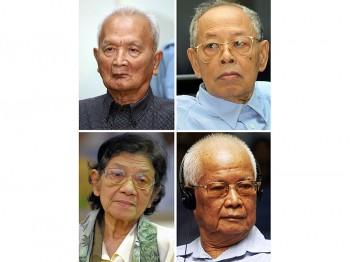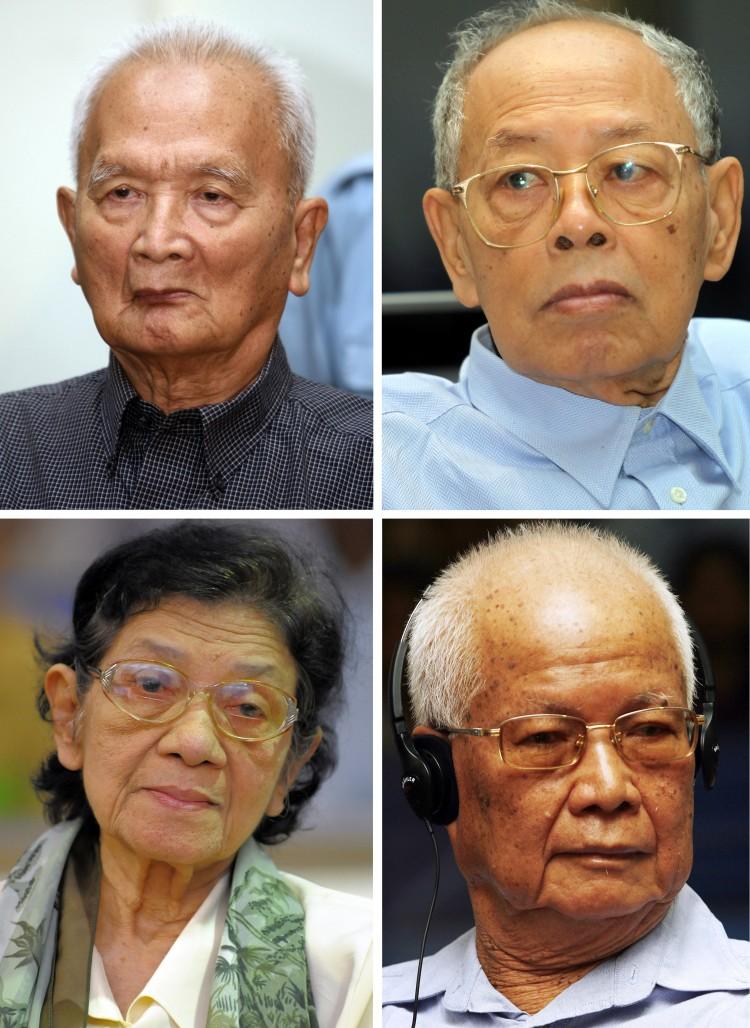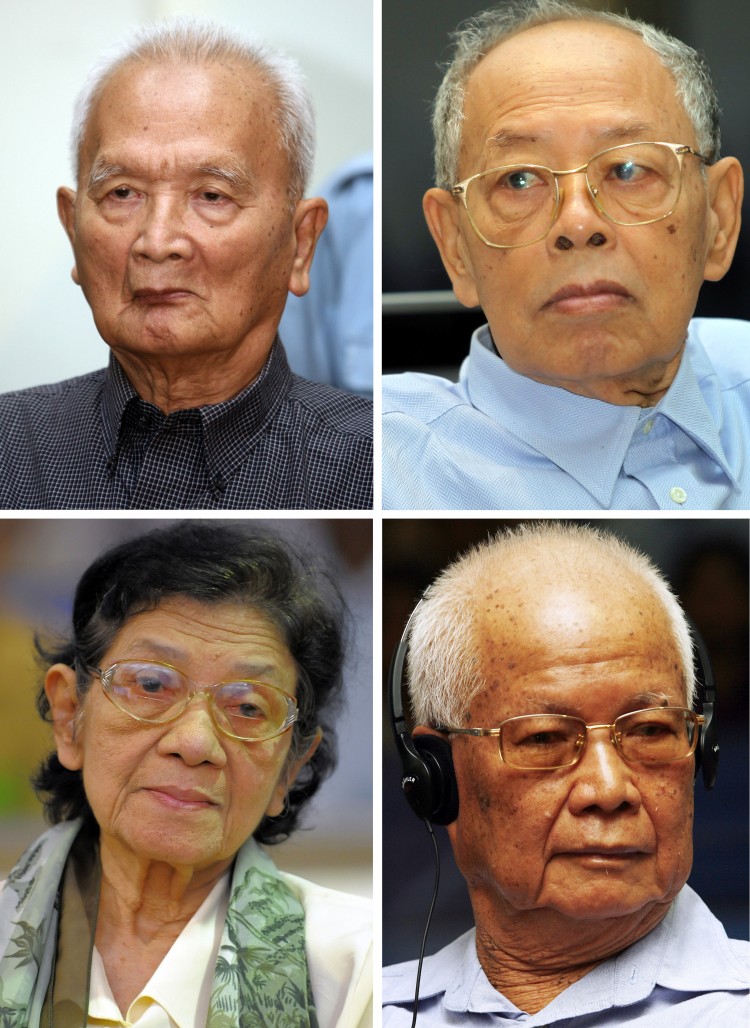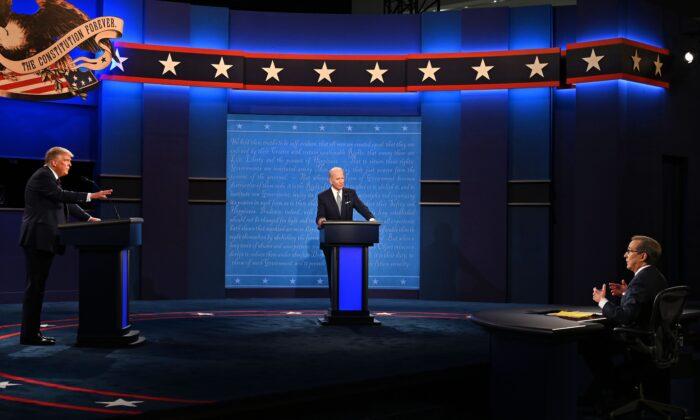Decades after the tyranny of Pol Pot’s communist rule, his four most senior leaders still alive were put on trial in Cambodia on Monday. Wrinkled, emotionless but with defiant expressions at times, the four faced the court over accusations of genocide that led to the killing of roughly 1.7 million Cambodians.
Under Pol Pot’s rule, from 1975 to 1979, inspired by Maoist principles, a quarter of the entire population was killed. Of the estimated 70,000 Buddhist monks in Cambodia before his rule, only 2,000 remained when Pot’s Khmer Rouge regime ended.
For many Cambodians who lived through the Khmer Rouge, the trial was a long-awaited one. On trial before the U.N.-backed Extraordinary Chambers in the Courts of Cambodia (ECCC), are Pol Pot’s second in command, Nuon Chea, former foreign minister, Ieng Sary, former head of state, Khieu Samphan, and former social affairs minister, Ieng Thirith.
“While the crimes of the Khmer Rouge were committed over a quarter of a century ago, they remain ingrained in Cambodia’s collective psyche,” said Ou Virak, president of the Cambodian Centre for Human Rights, in a statement.
Virak says he hopes the trial will provide the victims “with some sense of justice, however delayed that justice may be.”
All four are accused of genocide, murder, torture, religious persecution, crimes against humanity, and other war crimes during the time the Khmer Rouge was in power.
The four have so far denied the accusations and refuse to cooperate with the court. In their defense, the lawyers of “Brother Number Two” of Pol Pot, Nuon Chea, argued the proceedings against him should be terminated because the proceedings of the judicial investigation were “unfair” to their client.
Chea was the chief policy architect of the Communist Party of Kampuchea and controlled the country’s internal security apparatus.
In recent weeks the ECCC has come under fire over allegations of being subjected to political pressure. Cambodia’s government has allegedly exerted political pressure on the court to not pursue any further trials after this one.
The court is part of the Cambodian court system, but is considered a ‘hybrid’ tribunal since it also has international judges, prosecutors, and defense lawyers. Nonetheless, the majority of the staff are Cambodian.
The current trial is the ECCC’s second, known as Case 002. The first trial last year, Case 001, saw the conviction of Khmer Rouge torturer Kaing Guek Eav. Case 003 has been in the works for some time, but in early May it was suddenly announced that the cases were out of the court’s jurisdiction, since the accused was not a senior person responsible for the genocide.
“The Cambodian government has taken the position that it believes that first two cases sufficed and then after that the Khmer Rouge tribunal should wrap up its operations,” says John Ciorciari, an Associate Fellow with the Asia Society.
According to Ciorciari some of the international staff of the tribunal believe justice won’t be served unless more people are prosecuted. “The international co-prosecutor recently alleged that in cases three and four that the investigators did a halfhearted job and did so because they already decided they were going to dismiss the charges,” he says.
Earlier this month U.N. Secretary-General Ban Ki-moon dismissed allegations that judges of the tribunal had received instructions to dismiss the third case of the tribunal.
Under Pol Pot’s rule, from 1975 to 1979, inspired by Maoist principles, a quarter of the entire population was killed. Of the estimated 70,000 Buddhist monks in Cambodia before his rule, only 2,000 remained when Pot’s Khmer Rouge regime ended.
For many Cambodians who lived through the Khmer Rouge, the trial was a long-awaited one. On trial before the U.N.-backed Extraordinary Chambers in the Courts of Cambodia (ECCC), are Pol Pot’s second in command, Nuon Chea, former foreign minister, Ieng Sary, former head of state, Khieu Samphan, and former social affairs minister, Ieng Thirith.
“While the crimes of the Khmer Rouge were committed over a quarter of a century ago, they remain ingrained in Cambodia’s collective psyche,” said Ou Virak, president of the Cambodian Centre for Human Rights, in a statement.
Virak says he hopes the trial will provide the victims “with some sense of justice, however delayed that justice may be.”
All four are accused of genocide, murder, torture, religious persecution, crimes against humanity, and other war crimes during the time the Khmer Rouge was in power.
The four have so far denied the accusations and refuse to cooperate with the court. In their defense, the lawyers of “Brother Number Two” of Pol Pot, Nuon Chea, argued the proceedings against him should be terminated because the proceedings of the judicial investigation were “unfair” to their client.
Chea was the chief policy architect of the Communist Party of Kampuchea and controlled the country’s internal security apparatus.
In recent weeks the ECCC has come under fire over allegations of being subjected to political pressure. Cambodia’s government has allegedly exerted political pressure on the court to not pursue any further trials after this one.
The court is part of the Cambodian court system, but is considered a ‘hybrid’ tribunal since it also has international judges, prosecutors, and defense lawyers. Nonetheless, the majority of the staff are Cambodian.
The current trial is the ECCC’s second, known as Case 002. The first trial last year, Case 001, saw the conviction of Khmer Rouge torturer Kaing Guek Eav. Case 003 has been in the works for some time, but in early May it was suddenly announced that the cases were out of the court’s jurisdiction, since the accused was not a senior person responsible for the genocide.
“The Cambodian government has taken the position that it believes that first two cases sufficed and then after that the Khmer Rouge tribunal should wrap up its operations,” says John Ciorciari, an Associate Fellow with the Asia Society.
According to Ciorciari some of the international staff of the tribunal believe justice won’t be served unless more people are prosecuted. “The international co-prosecutor recently alleged that in cases three and four that the investigators did a halfhearted job and did so because they already decided they were going to dismiss the charges,” he says.
Earlier this month U.N. Secretary-General Ban Ki-moon dismissed allegations that judges of the tribunal had received instructions to dismiss the third case of the tribunal.







Friends Read Free